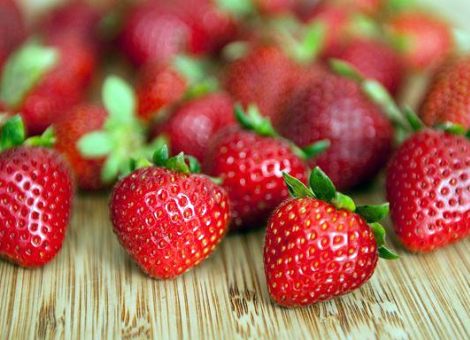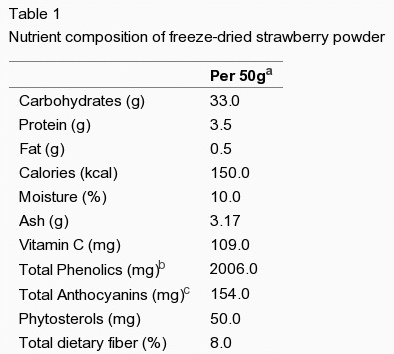Eat More Organic Strawberries
January 11, 2012 Written by JP [Font too small?]Avoid sugary foods. Cut back on carbohydrates. Skip dessert. If you’re at all interested in weight management and well being, you’ve probably been advised to follow one or all of these adages. But, how you apply this advice is as important as whether you follow it at all. For instance, if you avoid wholesome fruits such as strawberries you’re missing out on important health benefits that are frequently overlooked.
A study appearing in the January 2012 issue of the journal Cancer Prevention Research reports that consuming 60 grams/day of freeze dried strawberry powder protects against pre-malignant lesions in patients at high risk for esophageal cancer. These findings should be of interest to anyone living with chronic GERD or gastroesophageal reflux disease in particular. And, judging by the number of over-the-counter and prescription sales of GERD medications, this is a significant percentage of the population indeed. The good news about strawberry powder, as opposed to acid suppressing drugs, is that the strawberry powder used in this study was “well tolerated, with no toxic or serious adverse effects”.
The reason I advise my clients, family and friends to eat strawberries goes far beyond the esophagus. In short, strawberries are about as close to a perfect food for those with or at risk for cardiovascular disease, diabetes and metabolic syndrome. The research examining strawberry intake in relation to these conditions is extremely encouraging. Several human studies from 2010 and 2011 reveal that eating strawberries lowers multiple cardiometabolic risk factors including: insulin resistance, lipid levels and lipid oxidation and systemic inflammation (C-reactive protein and interleukin 6). Measures of circulatory health also tend to improve when strawberries are included in the diets of at risk subjects (ie obese individuals and those with abnormal blood sugar and/or elevated LDL cholesterol). It should also be noted that raw strawberries are an abundant source of folic acid. This B-vitamin is widely employed as a nutritional agent for lowering a potentially cardiotoxic amino acid known as homocysteine.
While I encourage most people to eat more strawberries, there are a few caveats. First and foremost, conventionally grown strawberries often contain worrisome levels of pesticide residues. According to a recent investigation, opting for organic versions of this fruit reduces pesticide exposure while, at the same time, improving the levels of naturally occurring antioxidants and flavor. Last but not least, if strawberries aren’t in season, rest assured that even heat processed forms of the fruit (ie. jam and purees) still maintain many of the health promoting properties of fresh strawberries. Just make sure to select products that don’t contain additives that may offset the goodness inherent in this amazing berry.
Note: Please check out the “Comments & Updates” section of this blog – at the bottom of the page. You can find the latest research about this topic there!
To learn more about the studies referenced in today’s column, please click on the following links:
Study 1 – Randomized Phase II Trial of Lyophilized Strawberries in Patients … (link)
Study 2 – Strawberry Anthocyanin and its Association with Postprandial … (link)
Study 3 – Effects of Dietary Strawberry Powder on Blood Lipids and Inflammatory … (link)
Study 4 – Attenuation of Meal-Induced Inflammatory and Thrombotic Responses … (link)
Study 5 – Strawberries Decrease Atherosclerotic Markers in Subjects with … (link)
Study 6 – Strawberry Modulates LDL Oxidation and Postprandial Lipemia in … (link)
Study 7 – Folate Content and Retention in Selected Raw and Processed Foods … (link)
Study 8 – Pesticide Residues in Some Commodities: Dietary Risk for Children … (link)
Study 9 – Fruit and Soil Quality of Organic and Conventional Strawberry … (link)
Study 10 – Strawberry Processing Does Not Affect the Production and Urinary … (link)
Freeze-Dried Strawberry Powder Supports Esophageal Health
Source: Nutr Res. 2010 July; 30(7): 462–469. (link)
Tags: Diabetes, Metabolic Syndrome, Organic
Posted in Food and Drink, Heart Health, Nutrition



January 11th, 2012 at 10:32 pm
Hello JP,
What great news this is! I just love strawberries and it this nice to hear how healthy they are for me.
They are plentiful here at Whole Foods.
Thank you JP,
Warm regards,
January 11th, 2012 at 10:48 pm
Thanks, Cynthia! I love them too. Fresh strawberries and a little homemade whipped cream is about as good as it gets, IMO. 🙂
Be well!
JP
January 12th, 2012 at 2:22 am
Good morning, JP 🙂
i’m sitting here and read your article with a bright smile in my face, eating the first “in season” organic sweet strawberries from spain ;-)))! They smelles so fantastically i had to buy them.
The pesticize levels are really a problem. Do you think i can go on pure unsweetened frozen organic strawberries until they are in season here? Hope they have still some benefits.
Love frozen organic strawberries for making a quick diy-sorbet: just puree them with a food processor and ad a few fresh mint leaves, vanilla powder and other frozen foods i.e. banana or a tabelspoon heavy cream! A easy very delicous sorbet 🙂
Be well!
Nina K.
January 12th, 2012 at 2:33 pm
Hi Nina. 🙂
I think frozen organic strawberries are a good alternative to fresh strawberries. Frozen strawberries still retain a good deal of the health promoting properties of their fresh counterparts:
http://informahealthcare.com/doi/abs/10.3109/09637481003796306
http://www.liebertonline.com/doi/abs/10.1089/jmf.2009.0048
http://pubs.acs.org/doi/abs/10.1021/jf801555q
Be well!
JP
January 18th, 2012 at 2:59 am
Great post JP! And thank you so much for the links, it helps me with my research. We live on an island and sadly don’t frequently get fresh, organic strawberries, so like Nina we have been buying frozen, from the UK.
January 18th, 2012 at 4:41 pm
Thank you, Wellness Coach. I’m happy to help!
Be well!
JP
February 5th, 2016 at 10:19 pm
Updated 2/5/16:
http://www.ncbi.nlm.nih.gov/pubmed/26842771
Mol Nutr Food Res. 2016 Feb 4.
A dose-response evaluation of freeze-dried strawberries independent of fiber content on metabolic indices in abdominally obese individuals with insulin-resistance in a randomized, single-blinded, diet-controlled crossover trial.
This study evaluated the dose-response relationship of strawberries, an anthocyanin-rich fruit, on postprandial glucose and insulin concentrations in individuals with insulin resistance (IR), including changes in plasma anthocyanins, markers of oxidative stress and inflammation. In a randomized controlled, 4-arm, dose-response, crossover trial, 21 adults with IR consumed a high-carbohydrate, high-fat meal with one of 4 beverages containing: 0 g freeze-dried whole strawberry powder (FDS, control), 10, 20 or 40 g FDS, controlled for fiber. Blood was collected at 0 min and at 30 min intervals post-meal until 2 h, then hourly until 6 h. Post-meal insulin concentrations (6 h) were significantly reduced after the 40 g FDS beverage compared to other beverages (p<0.05). Post-meal 6 h glucose concentrations were not different, although mean insulin:glucose ratio was significantly different among beverages (p<0.05). Pelargonidin-glucuronide was inversely associated with mean insulin concentrations after the 20 and 40 g FDS (p<0.05). Oxidized-LDL was reduced after 20 g FDS (p<0.05) and IL-6 was not different among treatments. Strawberry intake reduced the insulin demand to manage post-meal glucose in obese individuals with IR, which was related to plasma anthocyanin/ pelargonidin concentrations. The data support a role for strawberries in improving insulin sensitivity in people with IR.
Be well!
JP
April 12th, 2016 at 7:06 pm
Conventionally grown strawberries now top the Environmental Working Group’s “Dirty Dozen” list. Buy organic!
https://www.ewg.org/foodnews/strawberries.php
Be well!
JP
July 19th, 2016 at 6:47 pm
Updated 07/19/16:
http://www.ncbi.nlm.nih.gov/pubmed/27429802
J Nutr Metab. 2016;2016:3910630.
Effects of Dietary Strawberry Supplementation on Antioxidant Biomarkers in Obese Adults with Above Optimal Serum Lipids.
Berries have shown several cardiovascular health benefits and have been associated with antioxidant functions in experimental models. Clinical studies are limited. We examined the antioxidant effects of freeze-dried strawberries (FDS) in adults [n = 60; age: 49 ± 10 years; BMI: 36 ± 5 kg/m2 (mean ± SD)] with abdominal adiposity and elevated serum lipids. Participants were randomized to one of the following arms: low dose strawberry (25 g/day FDS), low dose control beverage (LD-C), high dose strawberry (50 g/d FDS), and high dose control beverage (HD-C) for 12 weeks. Control beverages were matched for calories and total fiber. Plasma antioxidant capacity, trace elements (copper, iron, selenium, and zinc), whole blood glutathione (GSH), and enzyme activity (catalase, glutathione peroxidase, and glutathione reductase) were examined at screening (0 week) and after 12 weeks’ intervention. At 12 weeks, plasma antioxidant capacity and glutathione levels were higher in the strawberry versus control groups (low and high dose FDS: 45% and 42% for plasma antioxidant capacity and 28% and 36% for glutathione, resp.); glutathione was higher in the high versus low dose strawberry group (all p < 0.05). Serum catalase activity was higher in the low dose strawberry (43%) versus control group (p < 0.01). No differences were noted in plasma trace elements and glutathione enzyme activity. Dietary strawberries may selectively increase plasma antioxidant biomarkers in obese adults with elevated lipids. Be well! JP
March 17th, 2017 at 7:00 pm
Updated 03/17/17:
https://www.cambridge.org/core/journals/british-journal-of-nutrition/article/div-classtitlestrawberry-and-cranberry-polyphenols-improve-insulin-sensitivity-in-insulin-resistant-non-diabetic-adults-a-parallel-double-blind-controlled-and-randomised-clinical-trialdiv/BE161AFE01DC29BC5208C33EC3B0034C
Br J Nutr. 2017 Mar 14:1-13.
Strawberry and cranberry polyphenols improve insulin sensitivity in insulin-resistant, non-diabetic adults: a parallel, double-blind, controlled and randomised clinical trial.
Plant-derived foods rich in polyphenols are associated with several cardiometabolic health benefits, such as reduced postprandial hyperglycaemia. However, their impact on whole-body insulin sensitivity using the hyperinsulinaemic-euglycaemic clamp technique remains under-studied. We aimed to determine the effects of strawberry and cranberry polyphenols (SCP) on insulin sensitivity, glucose tolerance, insulin secretion, lipid profile, inflammation and oxidative stress markers in free-living insulin-resistant overweight or obese human subjects (n 41) in a parallel, double-blind, controlled and randomised clinical trial. The experimental group consumed an SCP beverage (333 mg SCP) daily for 6 weeks, whereas the Control group received a flavour-matched Control beverage that contained 0 mg SCP. At the beginning and at the end of the experimental period, insulin sensitivity was assessed by a hyperinsulinaemic-euglycaemic clamp, and glucose tolerance and insulin secretion by a 2-h oral glucose tolerance test (OGTT). Insulin sensitivity increased in the SCP group as compared with the Control group (+0·9 (sem 0·5)×10-3 v. -0·5 (sem 0·5)×10-3 mg/kg per min per pmol, respectively, P=0·03). Compared with the Control group, the SCP group had a lower first-phase insulin secretion response as measured by C-peptide levels during the first 30 min of the OGTT (P=0·002). No differences were detected between the two groups for lipids and markers of inflammation and oxidative stress. A 6-week dietary intervention with 333 mg of polyphenols from strawberries and cranberries improved insulin sensitivity in overweight and obese non-diabetic, insulin-resistant human subjects but was not effective in improving other cardiometabolic risk factors.
Be well!
JP